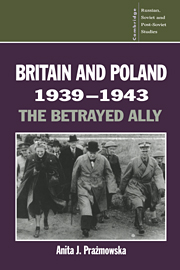Book contents
- Frontmatter
- Contents
- Preface
- Map
- 1 The formation of the Polish government-in-exile: ideology and war plans
- 2 Britain and German expansion in Eastern and South-eastern Europe
- 3 Britain's only fighting ally
- 4 Britain, Poland and the Soviet Union: June–December 1941
- 5 1942, year of disappointments
- 6 The illusion of an alliance ends
- 7 1943, the end of Polish–Soviet co-operation
- Conclusion
- Notes
- Bibliography
- Index
- Titles in the series
4 - Britain, Poland and the Soviet Union: June–December 1941
Published online by Cambridge University Press: 29 September 2009
- Frontmatter
- Contents
- Preface
- Map
- 1 The formation of the Polish government-in-exile: ideology and war plans
- 2 Britain and German expansion in Eastern and South-eastern Europe
- 3 Britain's only fighting ally
- 4 Britain, Poland and the Soviet Union: June–December 1941
- 5 1942, year of disappointments
- 6 The illusion of an alliance ends
- 7 1943, the end of Polish–Soviet co-operation
- Conclusion
- Notes
- Bibliography
- Index
- Titles in the series
Summary
On 22 July 1941 the much-anticipated German attack on the Soviet Union finally took place. On the evening of that day Churchill made a radio broadcast in which he publicly extended a hand of friendship to the soldiers defending the Soviet Union. The speech was conspicuous in stressing all that united the British and Soviet nations and leaving unmentioned all the issues which might have divided them. The Prime Minister's failure to make British–Soviet co-operation conditional on a Soviet commitment to restore Polish territories was deeply meaningful to the London Poles, whose ears were finally tuned into the possibility of betrayal. During the following month the politicians of the government-in-exile were no longer divided by the question of whether to re-establish relations with the Soviet Union. They all accepted the necessity for that. They now contended how to force the British and American governments to make their assistance to the Soviet Union conditional on the latter showing goodwill to the Poles. The failure of the two western democracies to champion the Polish cause became the most obvious sign of the rapidly diminishing importance of the Poles in allied diplomacy.
During July 1941 the Polish Prime Minister, following the policy approved by the Council of Ministers, opened talks with Maisky in order to arrive at a mutually acceptable treaty. This was finally signed on 30 July.
- Type
- Chapter
- Information
- Britain and Poland 1939–1943The Betrayed Ally, pp. 82 - 113Publisher: Cambridge University PressPrint publication year: 1995



